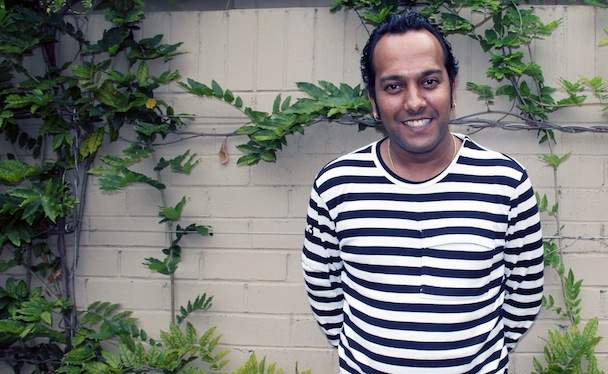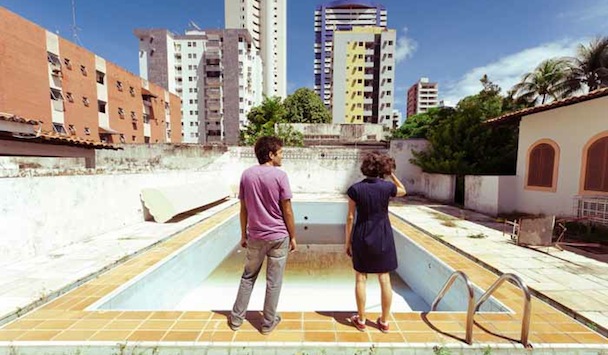Concrete Playground Meets Sydney Film Festival Director Nashen Moodley
We've already been counting down to those 12 days in June that are bad for our posture but good for our cinematic imaginations: the Sydney Film Festival.
We've already been counting down to those 12 days in June that are bad for our posture but good for our cinematic imaginations: the Sydney Film Festival. Now organisers have released a sneak peak of the programme to fuel our excitement. The 25 films named include striking Sundance hits such as Beasts of the Southern Wild, timely attention-grabbers such as Iran's Goodbye, and incisive documentaries of the likes of The Law in These Parts.
We spoke to Sydney Film Festival director Nashen Moodley about the films announced today and what he has in store for the rest of the festival.
This is your first year directing the festival. How are you settling into the job and the city?
I've had a soft landing, all things considered. I've had a warm reception and people have been extremely welcoming and helpful, so professionally it's been very exciting, and I've just found an apartment and moved in last week, so I'm settling in personally as well.
I feel like we're a bit festival mad here. There's always something on. Have you noticed?
Absolutely! There is always something on. And that's great, it's what makes the city so attractive ... Even though I haven't been here that long I've managed to go to a concert and a couple of plays. It's nice to be in a city with so much happening. I think Sydneysiders are really fortunate.
You see a lot of festivals — Sundance, Rotterdam and Berlin this year so far. What in your opinion makes a good festival?
Full cinemas, for one. Lots of filmmakers around, great films that reflect the diversity of world cinema. A balanced programme is really very important — that you have films from all over the world and different types of films, films of different genres, different themes, different styles. For me it's always very important that there's a sense of discovery in the films as well, that when you go to a festival you find out about new filmmakers, filmmakers you haven't heard of before or filmmakers who are making their very first feature film or their very first feature-length documentary.
Is that why this year we'll have the Film Festival Hub at Lower Town Hall, like a fringe component to the festival for the first time?
It's going to add a layer to the festival that I think is going to be really very successful and very important not just for the audience of the Sydney Film Festival but also for the visiting filmmakers ... We want people to hang out there in between screenings, to talk about the films they've seen, talk about the films they're about to see, have a few drinks, enjoy the talks. I think it's going to make a real difference to the atmosphere of the festival and we're very excited about the launch.
There's this real sense that it kind of connects up the disparate venues.
Absolutely. And it's within walking of all the venues, which is very important.
You've released a very tantalising teaser of 25 films from the programme today. Tell us a bit about those.
It represents very much what we want to achieve, which is this diversity I've been speaking about. At the same time we have really strong films that have won prizes at very prestigious festival around the world. We have a great documentary collection. I think people will hopefully look at this and feel we have a great festival in store.
Can you name some highlights in the bunch?
I'm excited to see the response of the audience to things like Beasts of the Southern Wild, Tabu and Neighbouring Sounds, very exciting new works by filmmakers who aren't necessarily known yet.
There's a documentary called Side by Side, in which Keanu Reeves interviews filmmakers about the change from film to digital. What current film trends excite you, and which turn you off?
I'm broadly excited by new filmmakers, that's what's exciting for me. 3D, for instance, doesn't excite me. I don't really look at cinema in terms of trend; I look at films individually.
There's been talk that cinema audiences will drop because of things like internet downloads and big-screen TVs. Yet film festival attendance seems strong. Why is that? What role do film festivals have to play in this environment?
I think there's just something wonderful about the communal experience of film festivals. And this idea that you are seeing something on the big screen that you won't necessarily get a chance to again in your life. And I always find if I go to a festival, I'm more likely to speak to a stranger about a film than if I went to a commercial showing of the film. At a commercial showing of the film I want to, you know, kill the person next to me because they're on their cell phone or whatever.
Another film in the programme, Maori Boy Genius, is about a 16-year-old prodigy with political potential. What were you like at 16, and was your calling as a film festival director already coming through?
I really loved cinema but I also loved music and was very interested in politics as well, very interested in literature. I was interested in lots of things and didn't quite know what I would do. Probably at that stage if you asked me I wanted to become a human rights lawyer!
Finally, we gather that your job requires you to sit around all day watching movies. Is it the best job in the world?
If only it was that simple! ... There's meetings and emails and negotiating about films and discussing with my colleagues various aspects of the festival that go beyond just the selection of films. But the bottom line is that I do still get paid to watch films, which is a pretty good way to make a living! I'm not sure it's the best job in the world, but it's pretty good.
See more of the Sydney Film Festival's sneak peak here.
https://youtube.com/watch?v=POLylqWL-j8






